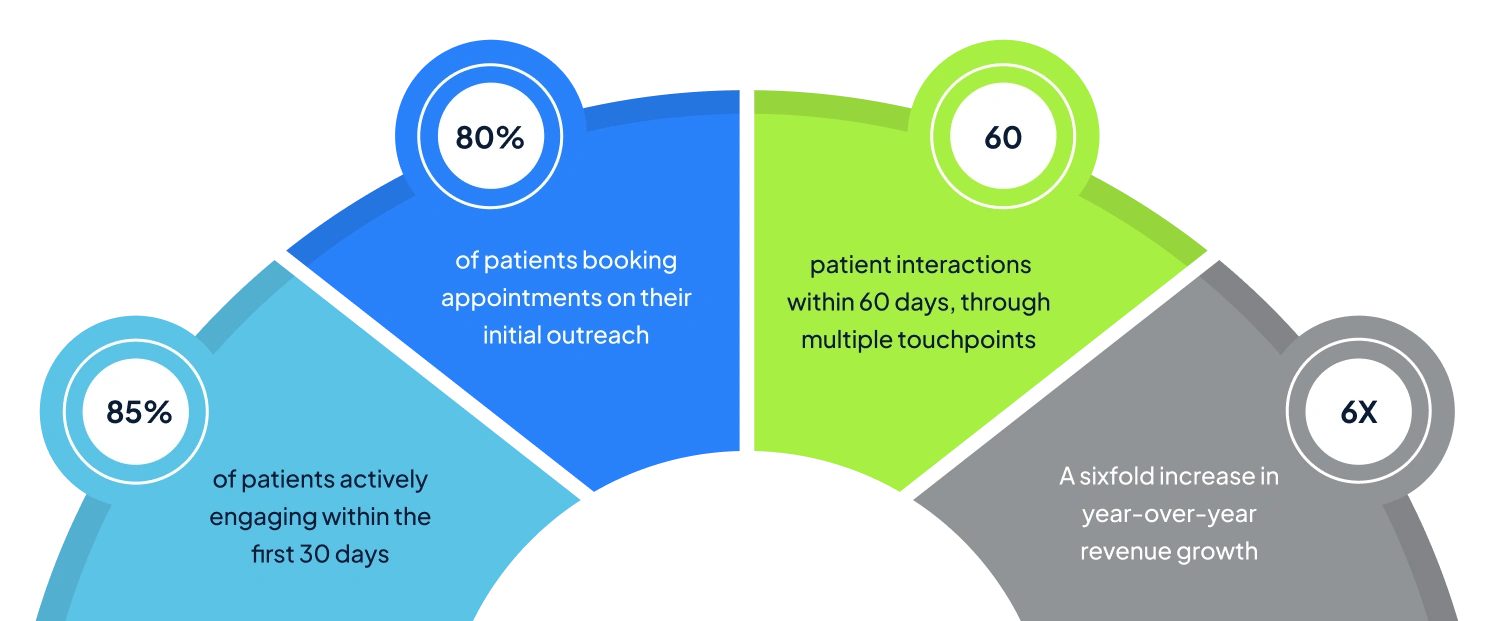The Best Patient Engagement Solutions in Georgia
Enhance Your Healthcare Delivery with VALiNTRY360’s Digital Solutions

Effective patient engagement is vital for improving healthcare quality, patient satisfaction, and health outcomes. Successfully engaged patients adhere more consistently to treatment plans, experience fewer hospital readmissions, manage chronic conditions more effectively, and foster healthier communities across Georgia.
For healthcare providers throughout Georgia, integrating digital patient engagement solutions is essential. Given the state’s diverse population, including significant elderly communities, expanding urban areas like Atlanta, rural populations, and consistent tourism, Georgia healthcare providers encounter unique challenges in delivering personalized, efficient care at scale.
Fortunately, advanced digital, cloud-based solutions exist specifically to overcome these unique healthcare challenges faced across the Peach State.
The Patient Engagement Challenge
Healthcare providers in Florida encounter multiple challenges in ensuring effective, personalized patient care:
Disconnected healthcare information systems create incomplete patient records, complicating comprehensive and timely care. Providers frequently struggle with limited access to accurate, real-time patient information across facilities and departments.
Solution:
Unified Patient Profiles
Build a holistic, 360-degree patient view, enabling providers to deliver tailored care plans that significantly improve patient outcomes
- Consolidate patient data from various sources such as electronic health records (EHRs), patient surveys, and wearable devices.
- Offer comprehensive patient histories, including social determinants of health, in one accessible platform.
- Foster collaborative care through secure and efficient data-sharing among authorized healthcare professionals.
Traditional methods of patient outreach frequently result in missed appointments and low treatment adherence, particularly among Georgia’s diverse and dispersed populations.
Solution:
Streamlined Communication
Implement multi-channel communication methods that significantly boost patient appointment attendance and treatment compliance.
- Utilize automated SMS reminders, emails, and patient portal notifications for effective patient outreach.
- Tailor communication based on patient preferences and preferred channels.
- Facilitate rapid two-way communication for timely patient responses and convenient appointment rescheduling.
Manual, outdated processes contribute to long waiting times and lower productivity, particularly impacting high-demand healthcare settings in urban areas like Atlanta.
Solution:
Automated Workflows
Optimize efficiency through AI-powered automation and advanced predictive analytics.
- Automate routine tasks such as scheduling appointments, reminders, and follow-up notifications.
- Deploy intelligent triage systems to effectively prioritize patient care.
- Employ predictive analytics to anticipate patient volumes and allocate staffing resources efficiently.
Balancing seamless digital patient interactions while maintaining rigorous HIPAA compliance standards becomes increasingly complex as digital healthcare expands.
Solution:
Secure Data Management
Secure Data Management Ensure full HIPAA compliance and patient data security through robust, secure digital infrastructure.
- Apply role-based access controls to safeguard sensitive patient information.
- Utilize advanced encryption technology and real-time data monitoring.
- Maintain detailed audit trails tracking data access and modifications.
Patients across Georgia’s vast geography and socioeconomic spectrum face uneven access to coordinated care.
Solution:
Population Health Management
Centralize care coordination to reduce disparities, lower healthcare costs, and deliver accessible, comprehensive care.
- Implement patient portals with unified profiles for streamlined communication and effective care plan management.
- Automate multi-channel outreach to enhance patient engagement, appointment attendance, and adherence.
- Use analytics to identify high-risk patient populations, track health metrics in real-time, and proactively manage emerging issues.
-
Fragmented Patient Data
-
Communication Gaps
-
Operational Inefficiencies
-
Regulatory Compliance
-
Limited Access / Fragmented Care
Disconnected healthcare information systems create incomplete patient records, complicating comprehensive and timely care. Providers frequently struggle with limited access to accurate, real-time patient information across facilities and departments.
Solution: Unified Patient Profiles
Build a holistic, 360-degree patient view, enabling providers to deliver tailored care plans that significantly improve patient outcomes.
- Consolidate patient data from various sources such as electronic health records (EHRs), patient surveys, and wearable devices.
- Offer comprehensive patient histories, including social determinants of health, in one accessible platform.
- Foster collaborative care through secure and efficient data-sharing among authorized healthcare professionals.
Traditional methods of patient outreach frequently result in missed appointments and low treatment adherence, particularly among Georgia’s diverse and dispersed populations.
Solution: Streamlined Communication
Implement multi-channel communication methods that significantly boost patient appointment attendance and treatment compliance.
- Utilize automated SMS reminders, emails, and patient portal notifications for effective patient outreach.
- Tailor communication based on patient preferences and preferred channels.
- Facilitate rapid two-way communication for timely patient responses and convenient appointment rescheduling.
Manual, outdated processes contribute to long waiting times and lower productivity, particularly impacting high-demand healthcare settings in urban areas like Atlanta.
Solution: Automated Workflows
Optimize efficiency through AI-powered automation and advanced predictive analytics.
- Automate routine tasks such as scheduling appointments, reminders, and follow-up notifications.
- Deploy intelligent triage systems to effectively prioritize patient care.
- Employ predictive analytics to anticipate patient volumes and allocate staffing resources efficiently.
Balancing seamless digital patient interactions while maintaining rigorous HIPAA compliance standards becomes increasingly complex as digital healthcare expands.
Solution: Secure Data Management
Secure Data Management Ensure full HIPAA compliance and patient data security through robust, secure digital infrastructure.
- Apply role-based access controls to safeguard sensitive patient information.
- Utilize advanced encryption technology and real-time data monitoring.
- Maintain detailed audit trails tracking data access and modifications.
Patients across Georgia’s vast geography and socioeconomic spectrum face uneven access to coordinated care.
Solution: Population Health Management
Centralize care coordination to reduce disparities, lower healthcare costs, and deliver accessible, comprehensive care.
- Implement patient portals with unified profiles for streamlined communication and effective care plan management.
- Automate multi-channel outreach to enhance patient engagement, appointment attendance, and adherence.
- Use analytics to identify high-risk patient populations, track health metrics in real-time, and proactively manage emerging issues.
VALiNTRY360’s Patient Engagement Solutions
Harness the power of digital, cloud-based technology to create a seamless, unified patient engagement platform:
-
Patient Management
-
Telehealth Integration
-
Appointment Management
-
Billing & Financial Management
-
Real-Time Insights
- Comprehensive patient records encompassing historical medical data, appointments, and past interactions.
- Personalized treatment recommendations tailored to individual patient needs and risk profiles.
- Automated delegation of tasks with real-time monitoring of care plan progress.

- Virtual consultations via integrated video conferencing to remove geographic barriers to care.
- Real-time remote patient monitoring for proactive health management.
- Continuous, secure messaging between patients and healthcare teams.

- Intelligent scheduling and optimized resource allocation for efficient operations.
- Automated reminders and easy rescheduling options to minimize appointment no-shows.
- Waitlist management tools to fill unexpected cancellations promptly.

- Automated billing systems simplifying financial transactions.
- Clear and upfront cost estimates paired with flexible payment options.
- Seamless integration of insurance verification and claims management.

- Predictive analytics to proactively identify and manage at-risk patient populations.
- Optimized resource allocation based on real-time patient data and usage patterns.
- Real-time monitoring of critical performance metrics, including patient satisfaction and care adherence.

Monitor complete patient history, including medical records, appointments, and past interactions.
- Deliver personalized care recommendations based on each patient’s unique profile and risk factors.
Implement care plans with automated task delegation and real-time progress tracking.

Integrate video conferencing for virtual consultations, removing barriers to accessing care.
- Utilize remote patient monitoring to track vital signs and symptoms in real time.
Facilitate secure messaging between patients and care teams to provide continuous support.

- Simplify scheduling with intelligent calendar management and optimized resource allocation.
- Minimize no-shows with automated reminders and convenient rescheduling options.
- Use waitlist management to efficiently fill last-minute cancellations.

Streamline financial operations with automated billing systems.
Offer clear cost estimates and flexible payment solutions for patients.
- Seamlessly integrate insurance verification and claims processing to enhance the financial experience.

Leverage predictive modeling to identify at-risk patients for timely interventions.
- Optimize resource distribution based on patient needs and past usage patterns.
Monitor and enhance key metrics like patient satisfaction, readmission rates, and adherence to care plans.
- Create custom reports and dashboards for real-time, data-driven decision-making across the organization.

What You Can Expect with VALiNTRY360’s Patient Engagement Solutions


Why Choose VALiNTRY360’s Patient Engagement Experts?
Specialists in digital patient engagement, specifically addressing Georgia’s healthcare complexities and demographic diversity.
Demonstrated measurable improvements in patient care coordination, health outcomes, and operational efficiencies.
Adaptable solutions specifically tailored to the unique needs of each provider, from smaller practices to expansive healthcare systems.
Ready to Upgrade Your Patient Engagement?
Whether your practice serves metropolitan Atlanta, rural regions, or coastal Savannah, outdated systems should not limit your healthcare success. VALiNTRY360’s digital solutions empower you to:
Increase patient
satisfaction
Elevate health
outcomes
Maximize operational
efficiency
Ensure regulatory
compliance
Drive financial
growth
Contact VALiNTRY360 today for your complimentary consultation and take the first step toward transforming your patient engagement approach, delivering exceptional care experiences throughout Georgia.
The Best Patient Engagement Solutions in Georgia FAQ By 
Patient engagement is the process of actively involving patients in their healthcare decisions, encouraging them to take part in their treatment plans.
Engaged patients experience better health outcomes, higher satisfaction, improved treatment adherence, and reduced overall healthcare costs.
Key challenges include fragmented patient data, communication barriers, inefficiencies in operations, and compliance with regulatory requirements.
Digital solutions help by creating unified patient profiles, simplifying communication, automating tasks, and ensuring secure management of patient data.
Population health management takes a proactive approach to improving health outcomes for groups of people, often targeting specific regions or patient demographics.
Implementing a PHM strategy leads to improved health outcomes, lower healthcare costs, enhanced care coordination, and more efficient resource management.
Data analytics help identify high-risk patients, forecast potential health issues, and provide valuable insights for targeted interventions and optimized resource allocation.
Social determinants of health refer to non-medical factors like housing, education, and income that affect health outcomes. They are key in PHM for addressing underlying causes of health disparities.
Telehealth supports virtual consultations, remote monitoring, and secure messaging, improving access to care and offering continuous support for patients.
VALiNTRY360 provides solutions for patient management, telehealth integration, appointment management, and billing to enhance patient engagement and improve overall care experiences.
Providers can leverage secure platforms that offer role-based access controls and create comprehensive audit trails for tracking all data access and modifications.
Success can be gauged by monitoring key metrics like patient satisfaction scores, appointment attendance rates, treatment compliance, and improvements in overall health outcomes.
AI supports predictive analytics, automates patient communication, streamlines triage processes, and offers personalized care recommendations based on patient data.
Chronic disease management focuses on continuous engagement and support for self-management, while acute care emphasizes short-term treatment adherence and timely follow-up.
Approaches include simplifying technology interfaces, offering multiple communication channels, involving family members, and providing in-person support when necessary.
By utilizing data-driven insights, providers can automate routine tasks while customizing meaningful interactions based on each patient’s unique needs and preferences.
Failing to implement effective population health management can lead to greater health disparities, escalating healthcare costs, suboptimal patient outcomes, and missed opportunities for preventive care and early detection.
Patient portals offer convenient access to medical records, appointment scheduling, secure messaging with providers, and tools to help manage care plans and medications effectively.
Providers can boost adoption by offering hands-on training and support, showcasing the advantages of digital tools, ensuring user-friendly design, and seamlessly integrating them into routine healthcare practices.


